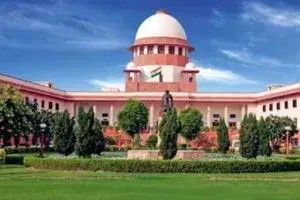As the entire Country is presently experiencing a complete lockdown so as to reduce the risk of spreading COVID-19, the Supreme Court, the High Courts and the subordinate Courts across the nation have paused regular functioning.
The Courts are confining themselves to hear matters that are considered urgent, using video-conferencing and other digital means, in order to have limited physical interaction with the litigants, lawyers and judges, and also to reduce congestion in Courts.
Measures for hearing urgent cases during the lockdown
On April 3, 2020, Hon’ble Justice DY Chandrachud, the Chairperson of the Supreme Court E-Committee, interacted with the Computer Committees of High Courts, to review the measures taken for hearing urgent cases promptly during the lockdown. It was suggested that use of technology must be institutionalised even after the lockdown is lifted and normalcy returns. Certain other aspects discussed in the meeting, but not limited to, are as follows:
- Creation of an e-filing module,which is in an advanced stage of development in the Supreme Court. The same has already been developed for trial courts;
- Complete use of facilitation centres, wherever available, or creating facilitation centres with facilities for e-filing and video conferencing at the entrances of court complexes in porta cabins;
- Development of a software patch which would include the facility of bulk adjournment cases and facilitate in sending SMSs to litigants and lawyers regarding the next dates of hearing;
- Live streaming of proceedings held by video conferencing, etc.
Supreme Court guidelines for the functioning of Courts through Video conference Hearings
On April 06, 2020, the Apex Court, suo-moto, took up a matter, titled as “In re Guidelines for Court Functioning through Video Conferencing during COVID 19 Pandemic”, prescribing guidelines for the functioning of the Courts through video-conferencing.
The Bench comprised of the Hon’ble Chief Justice of India, SA Bobde and Hon’ble Justices DY Chandrachud and L Nageswara Rao, who upon consideration of the recommendations made by Senior Advocate Vikas Singh in a letter addressing the CJI regarding long-term introduction of video conference hearings, issued the following directions:
- The COVID-19 outbreak demands social distancing, and in order to preserve the rule of law and the Constitution of the Country, it is essential to follow the social distancing guidelines;
- All hearings in congregation must necessarily be suspended. Technology has facilitated accessibility and connectivity, and the Indian Courts have always been proactive in harnessing technology. Further, the High Courts have now been authorised to employ measures for social distancing through the use of technology;
- Every High Court is authorised to determine modalities for use of video-conferencing;
- It is necessary to ensure that Court premises do not contribute to the spread of the virus, and thus, the measures that have been employed by Courts need to be given legal protection;
- Orders are being passed under Article 142 of the Constitution of India, and therefore, all necessary steps and precautions should be taken by the Supreme Court and High Courts to facilitate and promote social distancing and best public health guidelines;
- All Courts should maintain a helpline for grievances regarding video feed-line, during and immediately after the hearing;
- Courts should make appropriate arrangements for litigants who cannot access video-conferencing facilities;
- Until appropriate rules are framed by the High Courts, video-conferencing will be used;
- Evidence will not be recorded via video conferencing in any case. Further, where evidence must be recorded in a case, the presiding officer shall ensure that appropriate distance is being maintained inside the Courtroom;
- The Court will have the power to restrict entry into Courtrooms, as and when necessary to maintain distancing. Furthermore, no presiding officer will restrict the entry of the parties to the case unless the parties are suffering any health problems;
- Additionally, the Presiding officer will also have the power to adjourn proceedings if the courtroom crowd cannot be managed.
It was further reiterated that the directions mentioned herein above, have been issued to ensure that the Judiciary rises to face the unique challenge that has been brought about by the outbreak of COVID-19 pandemic, and that this order shall remain in place until further orders.
Related Posts
Novel Coronavirus (Covid -19) Outbreak: Delhi High Court takes its battle a Notch Higher
India: Threshold Limit under IBC Enhanced to INR 1 Crore amidst Coronavirus Crisis
Coronavirus Outbreak: IPAB adjourns hearings till April 21st and 22nd, 2020
India: The Functioning of the Indian Judiciary amidst Novel Coronavirus (COVID-19) Outbreak
Indian Supreme Court’s response to COVID – 19: extends period of limitation for all!


